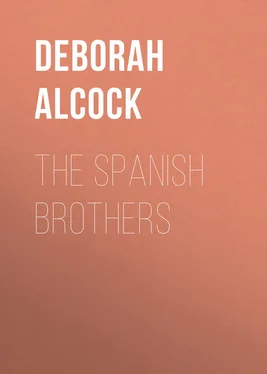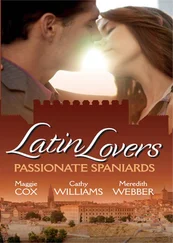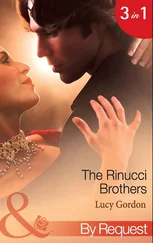Deborah Alcock - The Spanish Brothers
Здесь есть возможность читать онлайн «Deborah Alcock - The Spanish Brothers» — ознакомительный отрывок электронной книги совершенно бесплатно, а после прочтения отрывка купить полную версию. В некоторых случаях можно слушать аудио, скачать через торрент в формате fb2 и присутствует краткое содержание. Жанр: foreign_antique, foreign_prose, foreign_language, на английском языке. Описание произведения, (предисловие) а так же отзывы посетителей доступны на портале библиотеки ЛибКат.
- Название:The Spanish Brothers
- Автор:
- Жанр:
- Год:неизвестен
- ISBN:нет данных
- Рейтинг книги:4 / 5. Голосов: 1
-
Избранное:Добавить в избранное
- Отзывы:
-
Ваша оценка:
- 80
- 1
- 2
- 3
- 4
- 5
The Spanish Brothers: краткое содержание, описание и аннотация
Предлагаем к чтению аннотацию, описание, краткое содержание или предисловие (зависит от того, что написал сам автор книги «The Spanish Brothers»). Если вы не нашли необходимую информацию о книге — напишите в комментариях, мы постараемся отыскать её.
The Spanish Brothers — читать онлайн ознакомительный отрывок
Ниже представлен текст книги, разбитый по страницам. Система сохранения места последней прочитанной страницы, позволяет с удобством читать онлайн бесплатно книгу «The Spanish Brothers», без необходимости каждый раз заново искать на чём Вы остановились. Поставьте закладку, и сможете в любой момент перейти на страницу, на которой закончили чтение.
Интервал:
Закладка:
As Carlos drew nearer, it occurred to him that he had never seen this personage in any place of public resort, and for this reason, as well as from certain slight indications in his dress of fashions current in the north of Spain, he gathered that he was a stranger in Seville, who might be visiting the Cathedral from motives of curiosity. Before he came up the two men paused in their walk, and turning their backs to him, stood gazing thoughtfully at the hideous row of red and yellow Sanbenitos, or penitential garments, that hung above them.
"Surely," thought Carlos, "they might find better objects of attention than these ugly memorials of sin and shame, which bear witness that their late miserable wearers – Jews, Moors, blasphemers, or sorcerers, – have ended their dreary lives of penance, if not of penitence."
The attention of the stranger seemed to be particularly attracted by one of them, the largest of all. Indeed, Carlos himself had been struck by its unusual size; and upon one occasion he had even had the curiosity to read the inscription, which he remembered because it contained Juan's favourite name, Rodrigo. It was this: "Rodrigo Valer, a citizen of Lebrixa and Seville; an apostate and false apostle, who pretended to be sent from God." And now, as he approached with light though hasty footsteps, he distinctly heard Dr. Cristobal Losada, still looking at the Sanbenito, say to his companion, "Yes, señor; and also the Conde de Nuera, Don Juan Alvarez."
Don Juan Alvarez! What possible tie could link his father's name with the hideous thing they were gazing at? And what could the physician know about him of whom his own children knew so little? Carlos stood amazed, and pale with sudden emotion.
And thus the physician saw him, happening to turn at that moment. Had he not exerted all his presence of mind (and he possessed a great deal), he would himself have started visibly. The unexpected appearance of the person of whom we speak is in itself disconcerting; but it deserves another name when we are saying that of him or his which, if overheard, might endanger life, or what is more precious still than life. Losada was equal to the occasion, however. The usual greetings having been exchanged, he asked quietly whether Señor Don Carlos had come in search of him, and hoped that he did not owe the honour to any indisposition in his worship's noble family.
Carlos felt it rather a relief, under the circumstances, to have to say that his cousin's babe was alarmingly ill. "You will do us a great favour," he added, "by coming immediately. Doña Inez is very anxious."
The physician promised compliance; and turning to his companion, respectfully apologized for leaving him abruptly.
"A sick child's claim must not be postponed," said the stranger in reply. "Go, señor doctor, and God's blessing rest on your skill."
Carlos was struck by the noble bearing and courteous manner of the stranger, who, in his turn, was interested by the young man's anxiety about a sick babe. But with only a passing glance at the other, each went his different way, not dreaming that once again at least their paths were destined to cross.
The strange mention of his father's name that he had overheard filled the heart of Carlos with undefined uneasiness. He knew enough by that time to feel his childish belief in his father's stainless virtue a little shaken. What if a dreadful unexplained something, linking his fate with that of a convicted heretic, were yet to be learned? After all, the accursed arts of magic and sorcery were not so far removed from the alchemist's more legitimate labours, that a rash or presumptuous student might not very easily slide from one into the other. He had reason to believe that his father had played with alchemy, if he had not seriously devoted himself to its study. Nay, the thought had sometimes flashed unbidden across his mind that the "El Dorado" found might after all have been no other than the philosopher's stone. For he who has attained the power of producing gold at will may surely be said, without any stretch of metaphor, to have discovered a golden country. But at this period of his life the personal feelings of Carlos were so keen and absorbing that almost everything, consciously or unconsciously, was referred to them. And thus it was that an intense wish sprang up in his heart, that his father's secret might have descended to him .
Vain wish! The gold he needed or desired must be procured from a less inaccessible region than El Dorado, and without the aid of the philosopher's stone.
VI.
Don Carlos Forgets Himself Still Further
"The not so very false, as falsehood goes, —
The spinning out and drawing fine, you know;
Really mere novel-writing, of a sort,
Acting, improvising, make-believe, —
Surely not downright cheatery!"
It cost Carlos some time and trouble to drive away the haunting thoughts which Losada's words had awakened. But he succeeded at length; or perhaps it would be more truthful to say the bright eyes and witching smiles of Doña Beatriz accomplished the work for him.
Every dream, however, must have a waking. Sometimes a slight sound, ludicrously trivial in its cause, dispels a slumber fraught with wondrous visions, in which we have been playing the part of kings and emperors.
"Nephew Don Carlos," said Don Manuel one day, "is it not time you thought of shaving your head? You are learned enough for your Orders long ago, and 'in a plentiful house supper is soon dressed.'"
"True, señor my uncle," murmured Carlos, looking suddenly aghast. "But I am under the canonical age."
"But you can get a dispensation."
"Why such haste? There is time yet and to spare."
"That is not so sure. I hear the cura of San Lucar has one foot in the grave. The living is a good one, and I think I know where to go for it. So take care you lose not a heifer for want of a halter to hold it by."
With these words on his lips, Don Manuel went out. At the same moment Gonsalvo, who lay listlessly on a sofa at one end of the room, or rather court, reading "Lazarillo de Tormes," the first Spanish novel, burst into a loud paroxysm of laughter.
"What may be the theme of your merriment?" asked Carlos, turning his large dreamy eyes languidly towards him.
"Yourself, amigo mio. You would make the stone saints of the Cathedral laugh on their pedestals. There you stand, pale as marble, a living image of despair. Come, rouse yourself! What do you mean to do? Will you take what you wish, or let your chance slip by, and then sit and weep because you have it not? Will you be a priest or a man ? Make your choice this hour, for one you must be, and both you cannot be."
Carlos answered him not; in truth, he dared not answer him. Every word was the voice of his own heart; perhaps it was also, though he knew it not, the voice of the great tempter. He withdrew to his chamber, and barred and bolted himself in it. This was the first time in his life that solitude was a necessity to him. His uncle's words had brought with them a terrible revelation. He knew himself now too well; he knew what he loved, what he desired, or rather what he hungered and thirsted for with agonizing intensity. No; never the priest's frock for him. He must call Doña Beatriz de Lavella his – his before God's altar – or die.
Then came a thought, stinging him with sharp, sudden pain. It was a thought that should have come to him long ago, – "Juan!" And with the name, affection, memory, conscience, rose up together within him to combat the mad resolve of his passion.
Fiery passions slumbered in the heart of Carlos. Such are sometimes found united with a gentle temper, a weak will, and sensitive nerves. Woe to their possessor when they are aroused in their strength!
Читать дальшеИнтервал:
Закладка:
Похожие книги на «The Spanish Brothers»
Представляем Вашему вниманию похожие книги на «The Spanish Brothers» списком для выбора. Мы отобрали схожую по названию и смыслу литературу в надежде предоставить читателям больше вариантов отыскать новые, интересные, ещё непрочитанные произведения.
Обсуждение, отзывы о книге «The Spanish Brothers» и просто собственные мнения читателей. Оставьте ваши комментарии, напишите, что Вы думаете о произведении, его смысле или главных героях. Укажите что конкретно понравилось, а что нет, и почему Вы так считаете.












